Contents
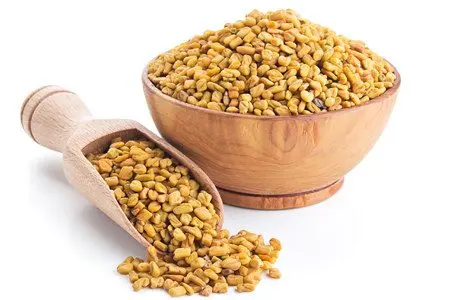
Fenugreek is an annual herbaceous plant belonging to the legume family. Its fruits are pods, each containing five to ten beans. Raw beans have a bitter taste and a maple flavor. In order for the fruits to lose their bitterness, they need to be fried a little. The popular name for the seeds of this plant is “Shambhala” or “Healing Helba”.
This herb has been used in Chinese and alternative medicine for thousands of years. It is used to treat skin and some other diseases. Cooked seeds of this plant were found in Iraq during excavations. These seeds are dated 4000 BC. Due to their pleasant sweet taste and their nutritional properties, these seeds are added to many traditional Indian dishes.
Recently, this plant has become widely used as an herbal supplement, the use of which is very beneficial for health. What benefits does this plant bring to the human body?
Fenugreek – what is this plant?
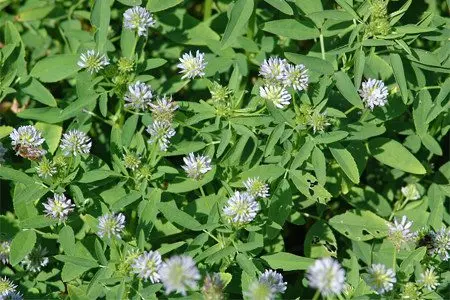
This annual plant with yellow flowers and seed-bearing pods grows in the Mediterranean and Asia. People traditionally use these seeds to treat various diseases, cooking and flavoring.
Fenugreek has a very strong maple flavor and can be used to flavor maple syrup. Raw seeds have a bitter taste. The bitterness of the seeds can be reduced by roasting or heating them to make them taste sweeter.
Where does it grow?
Fenugreek is very unpretentious, it often grows on loamy and clay soils. This culture is often found in the wild. Due to the beneficial properties of fenugreek, it can often be found in household plots.
Fenugreek grows in many countries such as Turkey, Armenia, Iraq, Iran, Ethiopia, India, Egypt. It also grows on the territory of Eastern European states, in the Caucasus, in the USA, France, Argentina, Morocco.
In Mediterranean countries, blue fenugreek is found mainly. A spicy seasoning is made from the ground part of this plant. This culture is rarer, therefore it is valued higher and it is more difficult to find it in the public domain.
A more common and popular variety of the plant is hay fenugreek, the properties of which are well known. A plant of this variety is used in cooking, as well as in cosmetology, traditional medicine, etc.
Health Benefits of Fenugreek Seeds
Composition of fenugreek
Fenugreek seeds contain the following valuable components:
Trigonelline: the betaine molecule, also present in coffee and alfalfa, may help prevent and treat diabetes.
4-hydroxyisoleucine and 2-oxoglutarate: molecules with insulin-stimulating action.
Protodioscin: a compound that can exert an aphrodisiac.
Diosgenin and Yamogenin: compounds used in the commercial synthesis of progesterone and other steroid products.
3-Hydroxy-4,5-dimethyl-2(5H)-furanone: a compound that causes the smell of maple syrup in body secretions.
Steroid saponins: diosgenin, yamogenin, tigogenin, ineotigogenin.
Calories 323 KKal
- Fats:
6,4 g
- Proteins:
23,0 g
- Carbohydrates:
58,4 g
- Water:
8,8 g
- Ash:
3,4 g
- Cellulose:
24,6 g
Vitamins | Quantity | % RDN |
Vitamin B6 (pyridoxine) | 0,6 mg | 30% |
Vitamin B1 (thiamine) | 0,3 mg | 22% |
Vitamin B2 (riboflavin) | 0,4 mg | 20% |
Vitamin B9 (folic acid) | 57,0 mcg | 14% |
Vitamin B3 (PP, nicotinic acid) | 1,6 mg | 8,2% |
Vitamin C (ascorbic acid) | 3,0 mg | 3,3% |
Minerals (in 100 g): | Quantity | %RDN |
Hardware | 33,5 mg | 186% |
Copper | 1,1 mg | 111% |
Manganese | 1,2 mg | 61% |
Magnesium | 191 mg | 48% |
Phosphorus | 296 mg | 37% |
Zinc | 2,5 mg | 21% |
potassium | 770 mg | 15,5% |
Selenium | 6,3 mcg | 12% |
Sodium | 67 mg | 5,2% |
Benefit for health
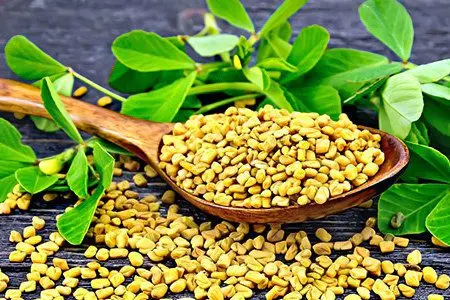
The use of fenugreek causes the following positive changes in the body:
Appetite control. According to three studies, there is a decrease in appetite and a decrease in fat intake. Two-week study showed a 17 percent reduction in total fat intake [1], [2].
Lowering cholesterol. Fenugreek has been shown to lower triglyceride and cholesterol levels. [3].
Heartburn. In a two-week study in people suffering from chronic heartburn, fenugreek reduced the symptoms of this pathological condition. It, in fact, had an effect comparable to the effect of taking antacids. [4].
Inflammation. After ingestion of the herb, an anti-inflammatory effect was observed in mice and rats. To confirm the spread of this action to people, it is necessary to conduct additional research by gathering a group of volunteers. [5].
Lowers blood sugar. According to animal and human studies, this plant is able to regulate blood sugar. A double-blind study was conducted over the course of two months, in which twenty-five people took part. It demonstrated that consumption of 1 g per day of a standardized fenugreek extract caused a significant improvement in sugar levels and insulin response compared to placebo. There was a decrease in triglyceride levels and an increase in levels of “good” HDL cholesterol [6].
In another scientific study, eighteen volunteers with type 25 diabetes took part. Every day they took ten grams of powdered seeds soaked in boiling water or mixed with yogurt. Sugar levels in people who took seeds soaked in water dropped by 30%. Their triglycerides decreased by 31%, and low-density lipoproteins by XNUMX%. There were no significant changes in people who consumed seeds soaked in yogurt. [7].
The plant is able to prevent the development of diabetes. Over the course of three years, a study was conducted that showed that people who had prediabetes and took 5 g of fenugreek powder twice a day had significantly less diabetes. The reason, most likely, was the decrease in their insulin resistance. Also, after taking this powder, a significant decrease in LDL “bad” cholesterol was noted. [8].
Benefits of Fenugreek for Men
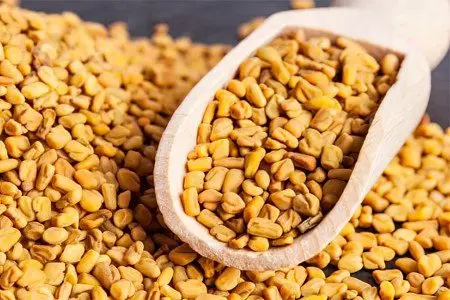
Testosterone and libido. Men often use fenugreek products to increase testosterone levels. Studies have shown that it has a positive effect on men’s health, including increasing libido.
For eight weeks, thirty young men of college age were involved in weightlifting for four hours a week. Half of them were given 500 mg of fenugreek daily. In the non-supplemented group, there was a slight decrease in testosterone levels. But in the fenugreek group, an increase was noted. The amount of body fat in the representatives of the second group decreased by 2% [9].
There was also a six-week study in which thirty men participated. They each received 600 mg of fenugreek extract. The aim of this study was to evaluate changes in libido and sexual function in the participants. Most of them reported improved sexual function and increased strength. [10].
Benefits of Fenugreek for Women
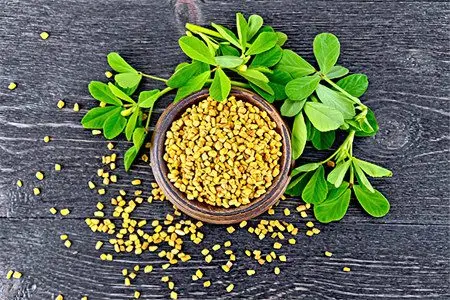
Menstrual cramps. Fenugreek tea and seeds have traditionally been considered effective remedies for menstrual cramps. Studies have shown that such use of this plant is also justified and brings the expected effect.
A study was conducted in which pills containing seeds were compared with placebo. Women who received fenugreek experienced a reduction in the duration and severity of pain compared to women who received placebo. [11].
Weight loss. Data confirming the ability of fenugreek to save people from excess weight has not yet been recorded. This plant slows down the digestion of carbohydrates, lowers glucose levels and stimulates the release of insulin, so theoretically it can increase appetite. It has even been used to treat anorexia. However, some use fenugreek seeds to suppress excessive appetite. Eating seeds rich in soluble fiber with water can help you feel full and get rid of hunger. [12].
Increases the amount of breast milk. Fenugreek seed tablets or teas are popular remedies for boosting breast milk production. It is believed that some substances present in the composition of fenugreek seeds have an estrogen-like effect.
As one supporting study showed, women in the fenugreek tea group had significantly more milk. Their children regained weight earlier compared to the control group as well as the placebo group [13].
Fenugreek hair
Fenugreek is often included in products designed to reduce dandruff and stimulate hair growth. Very little research has been done on these properties. According to one study, an oral supplement of fenugreek may improve hair growth compared to a placebo. [14].
Laboratory studies have demonstrated that fenugreek leaf extract has anti-inflammatory properties and may have antifungal effects. Therefore, it is useful to use it to combat dandruff and treat diseases of the scalp. [15].
The following recipes with fenugreek will help you improve the condition of your hair:
Traditional fenugreek oil for hair loss: Grind 35 g of seeds to a powder and place in a metal container. Then add 150 ml of sesame or coconut oil to it. Keep the resulting mass for six days in the sun, then strain. With regular use, this oil acts as a good tonic for the hair.
Fenugreek paste as hair conditioner: 9-10 g of seeds should be soaked overnight in water. Then make a paste from the soaked seeds, which must be applied to the head like a hair mask. The mass should remain on the hair for half an hour, after which it can be washed off with water. This product acts as a natural hair conditioner and is quite effective.
[Video] Dr. Vivek talks about the benefits of fenugreek and the intricacies of using it:









